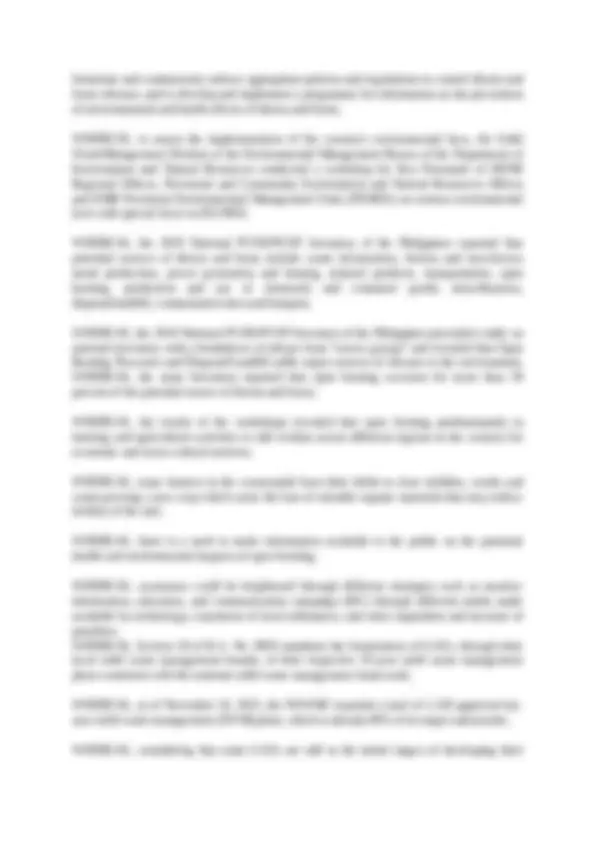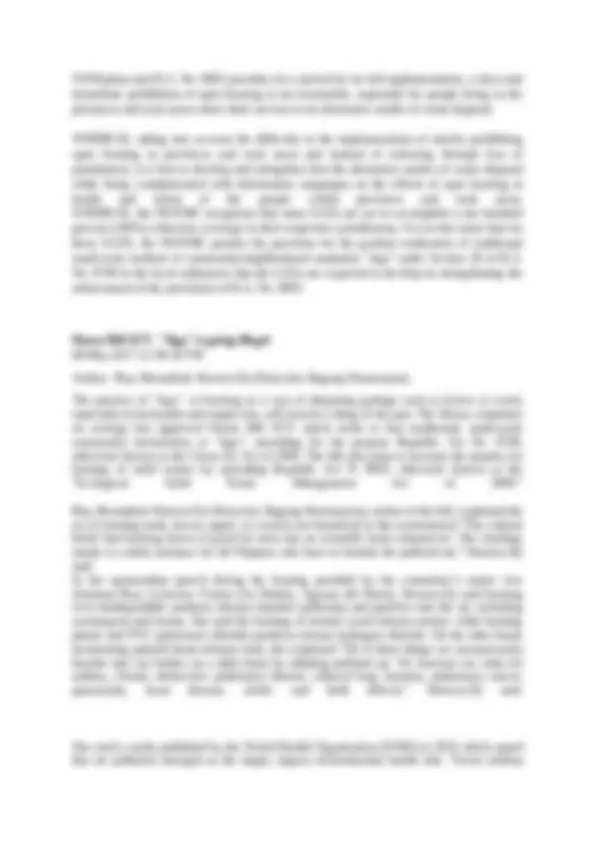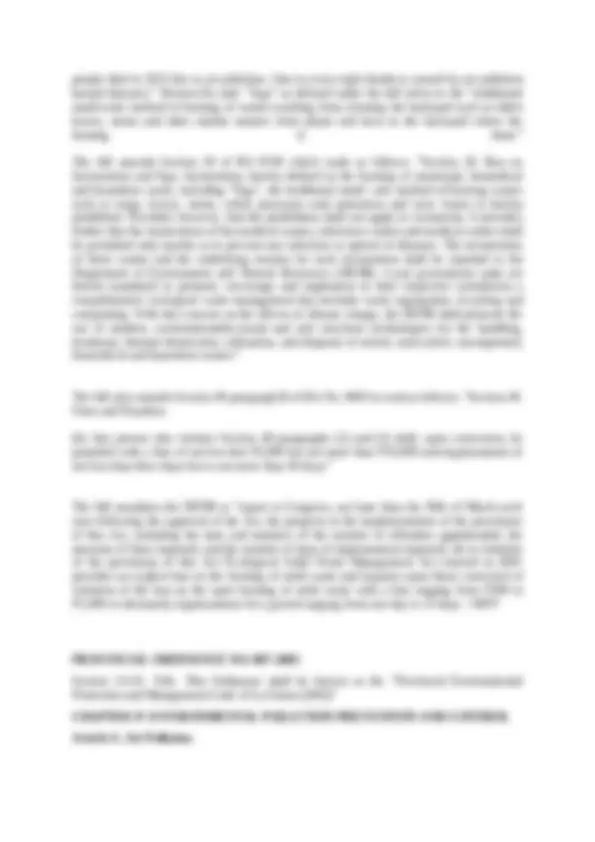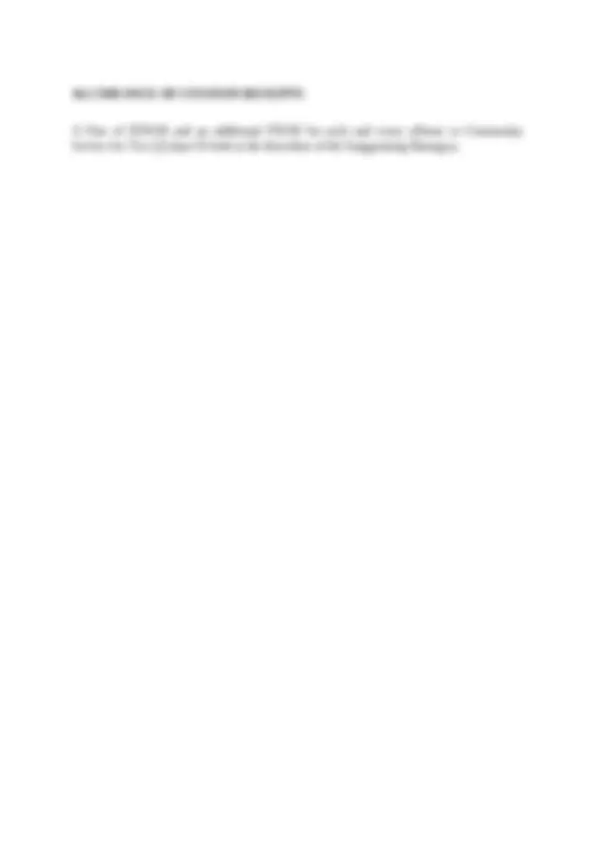






Study with the several resources on Docsity

Earn points by helping other students or get them with a premium plan


Prepare for your exams
Study with the several resources on Docsity

Earn points to download
Earn points by helping other students or get them with a premium plan
Community
Ask the community for help and clear up your study doubts
Discover the best universities in your country according to Docsity users
Free resources
Download our free guides on studying techniques, anxiety management strategies, and thesis advice from Docsity tutors
this can help the student to understand the lesson
Typology: Lab Reports
1 / 8

This page cannot be seen from the preview
Don't miss anything!





Laws and Ordinance about Open Burning According to Department of Environment and natural resources (DENR). Under the Ecological Solid Waste Management Act or R.A. 9003 and the R.A. 8749 or the Clean Air Act, it prohibits and penalizes open burning defined “as the thermal destruction of waste by means of direct exposure to fire.” Implementing rules of R. A. 8749 provides that “ no person shall be allowed to burn any materials in any quantities which shall cause the emission of toxic and poisonous fumes. Such material include but not limited to plastic ,” among others. Any violations will be meted by a fine of not less than Php10, 000.00 but not more than Php100, 00.00 or six (6) years of imprisonment or both. Burning of wastes is a violation of Ecological Solid Waste Management Act or RA 9003. Any violators of RA 9003 shall be subjected to criminal proceedings. Furthermore, Sec. 48, par. 3 of R.A. 9003 also prohibits the open burning of solid waste defined as “ all discarded household, commercial waste, non- hazardous institutional and industrial waste, street sweepings, construction debris, agricultural waste, and other non-hazardous/non-toxic solid waste.” A fine of not less than Php300.00 but not more than Php1,000.00, or imprisonment of not less than one day but not more than 15 days, or both awaits any violators. “Ecological Solid Waste Management Act of 2000”. AN ACT PROVIDING FOR AN ECOLOGICAL SOLID WASTE MANAGEMENT PROGRAM, CREATING THE NECESSARY INSTITUTIONAL MECHANISMS AND INCENTIVES, DECLARING CERTAIN ACTS PROHIBITED AND PROVIDING PENALTIES, APPROPRIATING FUNDS THEREFOR, AND FOR OTHER PURPOSES. This Act makes provision for the efficient solid waste management, for the volume reduction of the waste, its environment friendly disposal, composting, recycling, re-use, recovery, green charcoal process; for the collection, treatment and disposal in environmentally sound solid waste management facilities whereas it shall be possible to correctly dispose the proper segregation, collection, transport, storage, treatment and disposal of solid waste. It also concerns the protection of groundwater from pollution. Under this Act national research and development programs for improved solid waste management and resource conservation techniques shall be promoted and supported. Section 48. Prohibited Acts. – The following acts are prohibited: ( 2) Undertaking activities or operating, collecting or transporting equipment in violation of sanitation operation and other requirements or permits set forth in or established pursuant to this Act; (3) The open burning of solid waste; Section 49. Fines and Penalties. (b) Any person who violates Section 48 paragraphs (2) and (3) shall, upon conviction, be punished with a fine of not less that P2,000 but not more than P10,000 and imprisonment of not less than three days but to not more than 30 days.
National Solid Waste Management Commission RESOLUTION TO STRENGTHEN THE ENFORCEMENT OF THE PROVISIONS OF R.A. No. 9003 ON OPEN BURNING OF MUNICIPAL SOLID WASTES INCLUDING AGRICULTURAL WASTES Resolution No. 1468, Series of 2021 By: Benny D. Antiporda Approved on thi 24th^ day of November 2021 WHEREAS, Section 2 of Republic Act No. 9003 declared the policy of the State to adopt a systematic, comprehensive and ecological solid waste management program which shall ensure the protection of public health and the environment; WHEREAS, Section 5 of RA 9003, created the National Solid Waste Management Commission whose primary function is to oversee the implementation of solid waste management plans and prescribe policies to achieve the objectives of RA 9003; WHEREAS, Section 5.m of RA 9003 states that the Commission shall formulate education promotion and information campaign strategies; WHEREAS, Section 48, paragraph 3 of RA 9003 prohibits the open burning of solid wastes; WHEREAS, Rule III of the Implementing Rules and Regulations of RA 9003 defined open burning as the thermal destruction of wastes by means of direct exposure to fire and that this definition shall also apply to traditional small-scale community method of solid waste disposal and management or siga WHEREAS, the World Health Organization has identified dioxin and furan as highly toxic and can cause reproductive and developmental problems, damage the immune system, interfere with hormones and also cause cancer; WHEREAS, dioxin and furan had been included as part of persistent organic pollutants under the Stockholm Convention on Persistent Organic Pollutants or POPs, adopted on 22 May 2001 and entered into force on 17 May 2004, to protect human health and the environment from POPs; WHEREAS, the Philippines became a party to the Stockholm Convention on POPs on 27 February 2004 and ratified the Convention on 27 May 2004; WHEREAS, the Philippine National Implementation Plan for the Stockholm Convention on POPS identified one of its goals the progressive reductions and continuous monitoring in the releases of dioxins and furans and other unintentional POPs in the Philippines based on scientific knowledge: WHEREAS, the Philippine National Implementation Plan for the Stockholm Convention on POPS enumerated its objectives to reduce releases of dioxin and furan by developing and implementing. best available technologies/best environmental practices promotion, adopting and monitoring programmes across most significant dioxin and furan source categories, to
SWM plans and R.A. No. 9003 provides for a period for its full implementation, a strict and immediate prohibition of open burning is not reasonable, especially for people living in the provinces and rural areas where there are less or no alternative modes of waste disposal. WHEREAS, taking into account the difficulty in the implementation of strictly prohibiting open burning in provinces and rural areas and instead of enforcing through fear of punishment, it is best to develop and strengthen first the alternative modes of waste disposal while being complemented with information campaigns on the effects of open burning to health and safety of the people within provinces and rural areas. WHEREAS, the NSWMC recognizes that some LGUs are yet to accomplish a one hundred percent (100%) collection coverage in their respective jurisdictions. It is in this sense that for these LGUS, the NSWMC permits the provision for the gradual eradication of traditional small-scale method of community/neighborhood sanitation "siga" under Section 20 of R.A. No. 8749 in the local ordinances that the LGUs are expected to develop in strengthening the enforcement of the provisions of R.A. No. 9003. House Bill 4271 "Siga" is going illegal 08 May 2017 12:58:26 PM Author: Rep. Bernadette Herrera-Dy (Party-list, Bagong Henerasyon) The practice of “siga’’ or burning as a way of disposing garbage such as leaves or wood, especially in backyards and empty lots, will soon be a thing of the past. The House committee on ecology has approved House Bill 4271 which seeks to ban traditional, small-scale community incineration or “siga”, amending for the purpose Republic Act No. 8749, otherwise known as the Clean Air Act of 1999. The bill also aims to increase the penalty for burning of solid wastes by amending Republic Act N. 9003, otherwise known as the "Ecological Solid Waste Management Act of 2000." Rep. Bernadette Herrera-Dy (Party-list, Bagong Henerasyon), author of the bill, explained the act of burning trash, leaves, paper, or wood is not beneficial to the environment.“The cultural belief that burning leaves is good for trees has no scientific basis whatsoever. The resulting smoke is a daily nuisance for all Filipinos who have to breathe the polluted air,” Herrera-Dy said. In her sponsorship speech during the hearing presided by the committee’s senior vice chairman Rep. Lawrence Fortun (1st District, Agusan del Norte), Herrera-Dy said burning even biodegradable products releases harmful pollutants and particles into the air, including carcinogens and furans. She said the burning of treated wood releases arsenic while burning plastic and PVC (polyvinyl chloride) products release hydrogen chloride. On the other hand, incinerating painted items releases lead, she explained.“All of these things we unconsciously breathe into our bodies on a daily basis by inhaling polluted air. We increase our risks for asthma, chronic obstructive pulmonary disease, reduced lung function, pulmonary cancer, pneumonia, heart disease, stroke and birth defects,” Herrera-Dy said. She cited a study published by the World Health Organization (WHO) in 2014 which stated that air pollution emerged as the single, largest environmental health risk. “Seven million
people died in 2012 due to air pollution. One in every eight deaths is caused by air pollution hazard diseases,” Herrera-Dy said. “Siga” as defined under the bill refers to the “traditional small-scale method of burning of wastes resulting from cleaning the backyard such as fallen leaves, stems and other similar matters from plants and trees in the backyard where the burning is done.” The bill amends Section 20 of RA 8749 which reads as follows: “Section 20. Ban on Incineration and Siga. Incineration, hereby defined as the burning of municipal, biomedical and hazardous waste, including “Siga”, the traditional small -cale method of burning wastes such as twigs, leaves, stems, which processes emit poisonous and toxic fumes is hereby prohibited. Provided, however, that the prohibition shall not apply to crematoria. It provides further that the incineration of bio-medical wastes, infectious wastes and medical wastes shall be permitted only insofar as to prevent any infection or spread of diseases. The incineration of these wastes and the underlying reasons for such incineration shall be reported to the Department of Environment and Natural Resources (DENR). Local government units are hereby mandated to promote, encourage and implement in their respective jurisdiction a comprehensive ecological waste management that includes waste segregation, recycling and composting. With due concern on the effects of climate change, the DENR shall promote the use of modern, environmentally-sound and safe non-burn technologies for the handling, treatment, thermal destruction, utilization, and disposal of sorted, unrecycled, uncomposted, biomedical and hazardous wastes.” The bill also amends Section 49 paragraph B of RA No. 9003 to read as follows: “Section 49. Fines and Penalties. (b) Any person who violates Section 48 paragraphs (2) and (3) shall, upon conviction, be punished with a fine of not less that P2,000 but not more than P10,000 and imprisonment of not less than three days but to not more than 30 days.” The bill mandates the DENR to “report to Congress, not later than the 30th of March each year following the approval of the Act, the progress in the implementation of the provisions of this Act, including the date and statistics of the number of offenders apprehended, the amounts of fines imposed, and the number of days of imprisonment imposed, all in violation of the provisions of this Act.”Ecological Solid Waste Management Act enacted in 2001 provides an explicit ban on the burning of solid waste and imposes upon those convicted of violation of the ban on the open burning of solid waste with a fine ranging from P300 to P1,000 or alternately imprisonment for a period ranging from one day to 15 days. / MVP PROVINCIAL ORDINANCE NO. 007- Section 1A.01. Title. This Ordinance shall be known as the “Provincial Environmental Protection and Management Code of La Union (2002)” CHAPTER IV ENVIRONMENTAL POLLUTION PREVENTION AND CONTROL Article A. Air Pollution
The Ordinance is enacted for the following purposes: a. To guide, control, and regulate the generation, storage, collection, transportation, and disposal of solid waste within the barangay and promote an orderly and sanitary condition of surrounding. b. To enhance the total improvement and maintenance of the environment of the barangay through the necessary control and mitigation of the negative environment impact of solid waste. c. To promote and protect the health, safety, peace, convenience, and general welfare of the inhabitants of the Barangay. d. To minimize the generation of solid waste and maximize possible resources recovery and recycling. SECTOR 4.GOAL The goal of this Ordinance is the improvement/Enhancement of the environment and ecological conditions of the barangay. SECTOR 5. OBJECTIVE To enhance ecological balance and public health through sustainable and integrated waste management; a. To ensure cleanliness all the time through orderly waste management; b. To eradicate unsightly, uncovered, and overflowing waste containers in the streets, public places, and open spaces; c. To minimize pollution arising from harmful gases and particulates produced by burning and dumping of hazardous substances. SECTION 16. VIOLATION AND PENALTIES For violators disobeying any Provisions of the Ordinance, the penalties shall be as follows:
A Fine of P250.00 and an additional P50.00 for each and every offense or Community Service for Two (2) days Or both at the discretion of the Sangguniang Barangay.